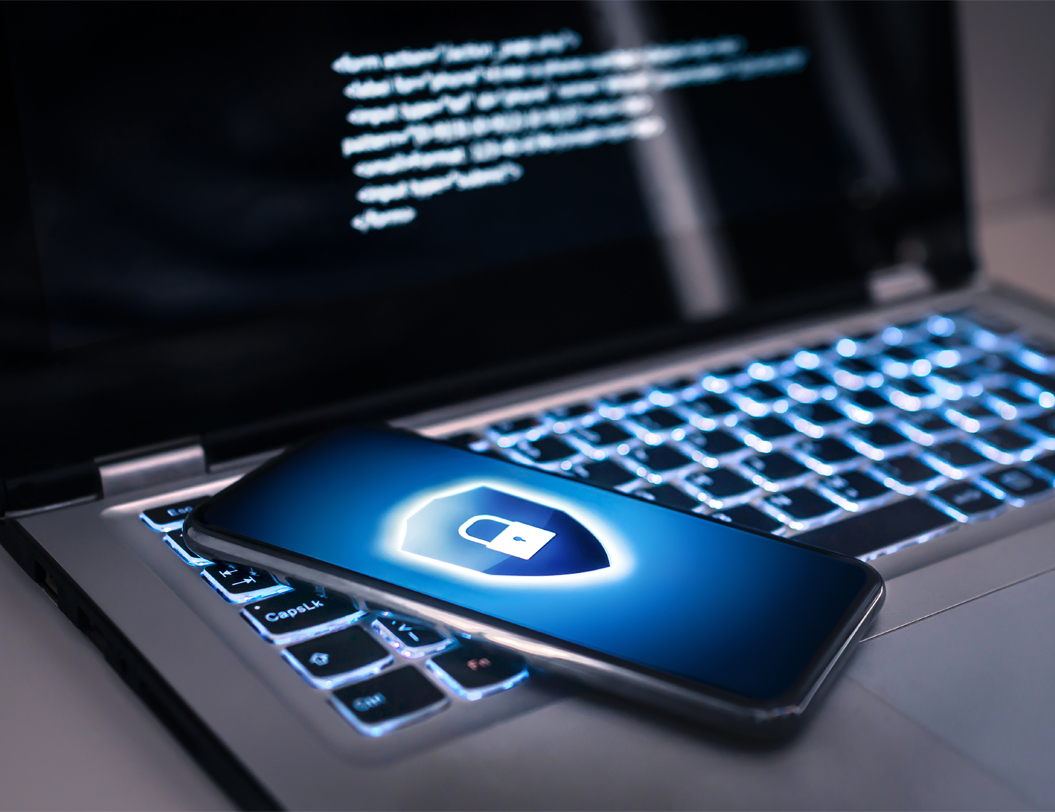Keeping Your Devices Secure
Fraud & Security

Your personal information is a valuable commodity. It’s not only the key to your financial identity, but also to your online identity. Protecting both is a must in the 21st century. The Federal Consumer Protection Agency advises maintaining appropriate security on your computers and other electronic devices.
Use Security Software
Install anti-virus software, anti-spyware software, spam filters, and a firewall. Set your preference to update these protections often. Protect against intrusions and infections that can compromise your computer files or passwords by installing security patches for your operating system and other software programs. A spam filter can help reduce the number of phishing emails you get.
Two tools that can protect you against pharming and other techniques that phishers use are anti-virus malware endpoint software and anti-spyware software. Anti-virus malware endpoint software scans incoming messages for troublesome files, while anti-spyware software looks for programs that have been installed on your computer and track your online activities without your knowledge. Additionally, firewalls prevent hackers and unauthorized communications from entering your computer – which is especially important if you have a broadband connection because your computer is open to the internet whenever it’s turned on. Look for programs that offer automatic updates and take advantage of free patches that manufacturers offer to fix newly discovered problems.
Just as important, other software applications should be consistently updated as well so that as time goes on, and threats change, advanced security vulnerabilities are able to “fix the hole” in a timely manner.
Avoid Phishing Emails
Don’t open files, click on links, or download programs sent by strangers. Opening a file from someone you don’t know could expose your system to a computer virus or spyware that captures your passwords or other information you type.
Click Carefully – Avoid visiting unknown websites or downloading software from untrusted sources. Sites hosting malware usually download compromising executable or script files silently and behind the scenes. If links or attachments in any email are unexpected and not requested for any reason, do not click and interact with the information and follow up with the source as needed.Fraudsters are turning to social media platforms and mobile channels such as Facebook, Whats App, general SMS, and elementary attacks via Snapchat and iMessage, including all the other available hangouts. Do not click on unsolicited email or message links.
Be Wise About Wi-Fi
Before you send personal information over your laptop or smartphone on a public wireless network in a coffee shop, library, airport, hotel, or other public place, see if your information will be protected. If you use an encrypted website, it protects only the information you send to and from that site. If you use a secure wireless network, all the information you send on that network is protected.
Connecting to public Wi-Fi (802.11) access points can be dangerous! Such access is also more likely to be risky during the holiday season. While very convenient and faster, it is highly suggested that one never conducts e-commerce transactions and purchase online with any device using free public Wi-Fi, even if the publicly available access point is using complex password logic.
Lock Up Your Laptop
Keep financial information on your laptop only when necessary. Don’t use an automatic login feature that saves your user name and password, and always log off when you’re finished. That way, if your laptop is stolen, it will be harder for a thief to get at your personal information.
Don’t leave PC’s or devices unattended! Physical security of any device is equally important as password enhancements and logical security. If you need to leave your desktop, phone, or tablet for any length of time, (especially in public space such as a library, etc.) lock it up so no one else can use your device whatsoever, and always lock your screen if you step away from your personal computer.
Read Privacy Policies
Yes, they can be long and complex, but they tell you how the site maintains accuracy, access, security, and control of the personal information it collects; how it uses the information, and whether it provides information to third parties.
USE STRONG PASSWORDS: It is highly suggested that the use of mnemonics be used for complex password retention in an effort to help anyone remember more elaborate password syntax structure. For example, the phrase “Hello! My name is Tom. I am twenty five (25) years old.” might make it easier for any person to remember an advanced password phrase greater than nine characters rather than “H!MniTiam25yo.”
Again, avoid phishing emails and do not click on any unwanted and unsolicited electronic mail. If you did not ask for the information, do not click at all!
Related Resources
-
man on cell phone looking stressed
Fraud & Security
Read MoreBeware of Debt-Collection Scams
Don’t be the next victim of a debt collection scam. Here’s all you need to know about these scams. -
ATM keypad
Fraud & Security
Read MoreSpot a Skimmer
Skimming devices are all-too-easy tools for thieves to capture your card information at places like ATMs, gas station terminals, or even store machines. Here are some helpful tips to spot a skimmer. -
Mother and daughter sitting on the couch talking
Saving & Budgeting
Read MoreTalking To The Kids About Your Salary
Kids curiosities may lead them to asking about your salary. Tailoring your answer to their age and reason for knowing may be a be a valuable opportunity to help your children understand the realities of the adult world.


